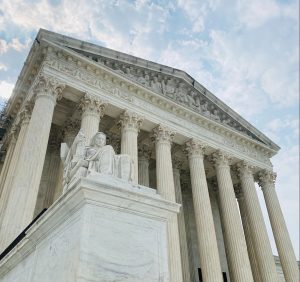The Shifting Paradigm
 This past June, the landscape of college admissions was dramatically altered when the Supreme Court ruled against race-conscious admissions policies at the University of North Carolina and Harvard University.
This past June, the landscape of college admissions was dramatically altered when the Supreme Court ruled against race-conscious admissions policies at the University of North Carolina and Harvard University.
Universities have long argued that eliminating race-conscious admissions will impede their ability to construct diverse student bodies which are critical to creating an enhanced learning environment and to prepare students to go out into a globalized world.
California is one state, among others, that has served as a testbed for the elimination of race-conscious admissions and the impact it will have on student body diversity. In 1996, after Proposition 209 was passed eliminating race-based admissions, the Black and Latino populations at UCLA and UC Berkeley dropped by nearly half and have never fully recovered.
With Black, Hispanic and mixed-race enrollment at Princeton High School approaching 25%, this is an issue that will have tangible implications for minority and non-minority families alike.
But before we get into those, I want to take a moment to take a quick look at the decision itself.
Decoding the Legal Verdict
The Supreme Court’s ruling against race-conscious admissions is grounded in the 14th Amendment’s Equal Protection Clause. The ruling states that race-conscious admissions violate the Equal Protection Clause of the 14th Amendment, which requires that individuals be treated equally under the law. With this ruling, race-conscious policies have been determined to be discriminatory against White and Asian applicants, which actually runs counter to the reasons the 14th amendment was originally established. Passed by Congress June 13, 1866, and ratified July 9, 1868, the 14th Amendment extended liberties and rights granted by the Bill of Rights to formerly enslaved people. But now, “Students for Fair Admissions” (the plaintiffs) have successfully argued that non-minority populations have become the victims of race-conscious admissions policies. Today, at Princeton High School, 75% of the student body is white or Asian.
In his 1965 Commencement Address at Howard University, President Lyndon B. Johnson said, “You do not take a person who, for years, has been hobbled by chains and liberate him, bring him up to the starting line of a race and then say, ‘You are free to compete with all the others,’ and still justly believe that you have been completely fair.” While there has been much progress since then, there are still significant wealth, income and education gaps that adversely affect minority populations.
That being said, let’s look at how this is going to affect students on both sides of the issue.
The Essay Redesign
Because universities can no longer consider race as a direct factor in college admissions, many colleges and universities have changed or added new supplemental essays. For instance, Sarah Lawrence College took the ruling quite literally and introduced the following question:
“In a 2023 majority decision of the Supreme Court of the United States, Chief Justice John Roberts wrote, “Nothing prohibits universities from considering an applicant’s discussion of how race affected the applicant’s life, so long as that discussion is concretely tied to a quality of character or unique ability that the particular applicant can contribute to the university.” Drawing upon examples from your life, a quality of your character, and/or a unique ability you possess, describe how you believe your goals for a college education might be impacted, influenced, or affected by the Court’s decision.”
 Growing up in Princeton, the experiences you’ve had—perhaps as part of Princeton Little League or swimming at the Community Park pool—can actually offer a unique lens into your upbringing and how race has shaped your life. The good news is, colleges are still open to hearing about these experiences, as long as they’re framed in a way that doesn’t conflict with the recent court ruling.
Growing up in Princeton, the experiences you’ve had—perhaps as part of Princeton Little League or swimming at the Community Park pool—can actually offer a unique lens into your upbringing and how race has shaped your life. The good news is, colleges are still open to hearing about these experiences, as long as they’re framed in a way that doesn’t conflict with the recent court ruling.
Many other colleges and universities have also made adjustments. For more examples of how schools have adjusted their essay prompts given the court’s ruling, read “A Sea Change in College Admissions: How the Supreme Court Ruling is Affecting Application Essays” and how, regardless which side of the issue you are on, you can approach writing these essays.
The Test-Optional Wave
For those who are concerned about taking SATs or ACTs, pre-pandemic there were nearly 1,100 colleges and universities that adopted test-optional or test-free policies. As the pandemic raged with remote schooling, quarantine and a general inability to travel to test centers, the number of schools that adopted test-optional/test-free policies–on either a pilot or permanent basis–rose to nearly 2,000 schools where it sits today. Of the 158 colleges and universities that PHS students attended from the class of 2022, only 3, Georgetown University, the US Naval Academy and the US Armed Forces Academy required either the SAT or ACT.
Given the court’s ruling eliminating race-conscious admissions, colleges are likely to solidify test-optional policies. The new policy can help level the playing field for students from diverse backgrounds, including those who may not have access to expensive test prep services. Additionally, for students who simply are not good test takers, they can have the expectation that they will be considered at colleges and universities that would have previously been unattainable without extremely high test scores.
It is important to note; however, that test-optional/free policies will not be a panacea. Other holistic admissions factors such as grades, extracurricular activities, essays, interviews and letters of recommendation will become even more important and also require that students have access to resources that will enable them to flourish both in and out of the classroom. Test-optional policies will also lead to more students applying to the most-selective schools that would have previously been avoided, making them even more competitive for everyone.
But if testing is not your strength and you think you are strong in these other holistic areas, don’t be afraid to reach for the stars!
Socioeconomic Indicators
 With race off the table, there is likely to be an increased focus on socioeconomic status as a diversity indicator. In this case, more affluent students could find themselves somewhat disadvantaged compared to applicants from lower-income backgrounds. Let’s be clear here. Getting admitted to highly-selective colleges and universities does not require that students are saddled with adversity. Rather, it is adversity and the challenges that come along with it that are often catalysts of character development and one’s ability to demonstrate potential. For students who come from more well-to-do backgrounds, character development and demonstrating one’s potential can be realized through the quality and depth of the experiences and activities they choose to pursue. In other words, regardless of one’s socio-economic status, developing character and demonstrating potential are within your grasp.
With race off the table, there is likely to be an increased focus on socioeconomic status as a diversity indicator. In this case, more affluent students could find themselves somewhat disadvantaged compared to applicants from lower-income backgrounds. Let’s be clear here. Getting admitted to highly-selective colleges and universities does not require that students are saddled with adversity. Rather, it is adversity and the challenges that come along with it that are often catalysts of character development and one’s ability to demonstrate potential. For students who come from more well-to-do backgrounds, character development and demonstrating one’s potential can be realized through the quality and depth of the experiences and activities they choose to pursue. In other words, regardless of one’s socio-economic status, developing character and demonstrating potential are within your grasp.
The Legacy Question
With these legal changes, we are also likely to see a coordinated effort to eliminate legacy-based admissions as an equivalently egregious violation of the Equal Protection Clause. It will be argued that for students who apply to colleges where parents or siblings have attended, it creates an unfair advantage for those students. It is also reality that legacy-based admissions tend to favor students from more affluent backgrounds. But don’t forget, your family connections to the institution can still offer an inside perspective on the college experience and admission nuances, even if it doesn’t directly impact your chances of matriculation.
What’s Next?
 The end of affirmative action is a significant setback for minority students, many of whom already grapple with systemic barriers and limited resources.
The end of affirmative action is a significant setback for minority students, many of whom already grapple with systemic barriers and limited resources.
The harsh reality is that top schools will become even more competitive for all students. And so, students with less-robust profiles should widen their net and look for colleges that offer excellent programs but with better chances of admission.
In a post-affirmative action world, all students need to focus on enhancing their profiles in various ways:
- Take the most challenging curriculum that will enable you to thrive both in and out of the classroom. Princeton High School is offering 31 AP classes for the 2023-2024 school year, and many accelerated class options as well.
- Look to develop deeper, more meaningful experiences outside of the classroom as these will provide the basis for the stories you will tell in your applications. For example, if you are interested in mastering the art of photography and becoming fluent in French, don’t just stop at joining the Princeton Photography Club or engaging in chit-chat with the Alliance Francaise de Princeton. Instead, ponder how you can seamlessly blend insights from one realm into the other.
- Learn to tell authentically compelling stories that demonstrate your character and potential through your essays, interviews, and brag sheets — which will inform your letters of recommendation.
- Build meaningful relationships with teachers and your guidance counselor; you have more influence on what they will write in your recommendations than you may think.
- Race-conscious admissions no longer exist and legacy-based admissions days are numbered so everyone will have to prove their own merit.
Final Thoughts
Moving forward, adaptability will be your strongest asset. Yes, the path to college is becoming more complicated with obstacles and opportunities alike. To tackle these successfully, planning, broadening perspectives with authenticity and purpose and a focus on becoming the best version of yourself will be your guiding stars. Start early. 9th grade if possible. It will give you the advantage you need to traverse this altered landscape.
Resources:
Free seminar in Princeton: “Write Your Way into College: Secrets of a Successful Admissions Essay”
Your Insider’s Guide to Selective College Admissions
And if you want someone to guide you through every step of the process, Princeton College Consulting is here to help!

Peter Tilles has successfully navigated students and their families through the highly competitive college admissions process for over 13 years. Understanding that college admissions is fundamentally a character based evaluation, Peter has been able to help students achieve their lofty college admissions goals through a focus on authentic character development that enables students to develop the necessary skills and experiences that lead to the achievement of significant personal growth. Currently, Peter works with a select number of students in the U.S., Asia, Europe and South America and can also frequently be found on the road visiting admissions officers at various colleges to better understand their institutional priorities and how they evaluate student applications. Peter is a frequent guest speaker on the ultra-competitive college admissions and athletic recruiting processes, speaking both in the US and internationally. A graduate of Syracuse University, Peter brings 30 years of experience as a successful entrepreneur and senior executive to bear on the college admissions process. He has served in numerous senior strategic, operational and leadership roles with Citigroup, UBS and PDI. Peter has also served and continues to serve on various for-profit and non-profit boards and is also a member of NACAC and NJACAC.
